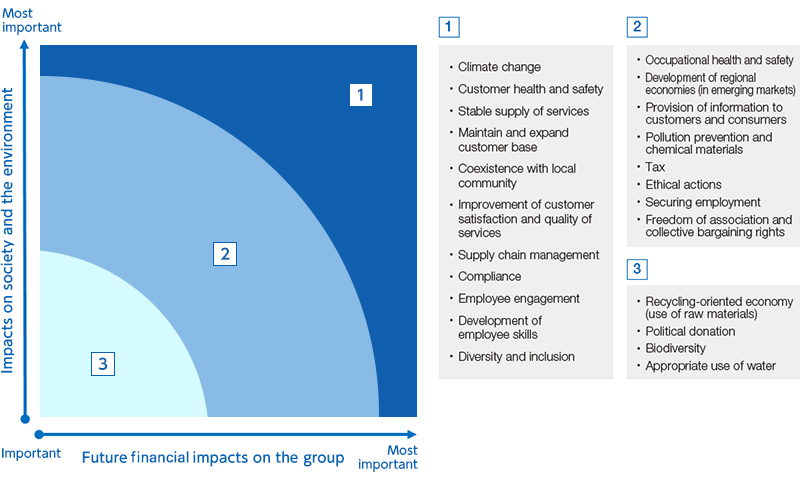Materiality Review Cycle
Materiality Review Cycle
The Daigas Group identifies the materiality for the Group as a means of grasping the possible impacts of the Group's business activities on the environment and society, and conducting its business operations while managing ongoing impacts and these possible impacts. The Group identified materiality for the first time in FY2014, and has been conducting PDCA management since FY2015. Every year, the progress of actions taken under each indicator is confirmed while problems to be tackled are studied in light of the progress made. Fields whose indicators are found to be short of the required levels are improved and managed properly. The Daigas Group will continue to review materiality on a cyclical basis and fulfill its responsibility to the environment and society. By doing so, we aim to create value for stakeholders and contribute to the development of a sustainable society.

STEP 1: Evaluate Materiality Activities
We will comprehensively evaluate the activities undertaken every year under each materiality item. Subject to the evaluation is the progress of CSR actions under main KPIs. We will also check whether each target has been set appropriately while recognizing what has been achieved and what remains as problems.
In evaluating materiality activities, we will interview persons in charge of management in relevant in-house sections, while holding meetings with outside experts. Based on the interviews and the meetings, we will sort out new issues and important issues to be studied for materiality review.
STEP 2: Decide the Order of Materiality Items according to Priority and Identify Boundaries to Be Managed
Through repeated discussions with the relevant internal organizations, we identify materiality items that must be given higher priority, as well as internal and outside “boundaries” that must be addressed. This process takes into consideration our business operations and changes in the business environment, as well as social trends related to sustainability. In the latest materiality review process, the Daigas Group identified materiality in light of experts’ opinions and other factors, taking into account the progress of climate change countermeasures, changes in the business environment, and social trends related to sustainability.
STEP 3: Confirm if the Reviewed Materiality Is Appropriate through Outside Experts and Dialogue with Them
Following internal examinations and reviews of the materiality, we request an evaluation of the appropriateness of the materiality to outside experts in certain fields, who represent the voices of society and stakeholders.
The experts are asked to provide opinions on whether the items recognized by us as materiality are appropriate, and whether there are any other items that should be recognized as materiality in light of the perceived views of society and our stakeholders. We will examine the materiality once again based on these opinions.
STEP 4: Identify New Materiality
We finalize the newly identified materiality items and key performance indicators (KPIs) with the approval of the Group's ESG Committee, the ESG Council, and the Board of Directors, and establish a management framework before implementing the necessary initiatives.
Materiality Identification in the Past
■ Materiality Identification in the Past

■ Impact Evaluation Chart (Reviewed in 2021)

- Management Plan
- Management Plan Documents Long-Term Management Vision2030/Medium-Term Management Plan 2026
- Daigas Group's Values
- Daigas Group's Values Daigas Group Corporate Principles Daigas Group Charter of Business Conduct Daigas Group Code of Business Conduct Our Declaration Daigas Group Policies
- Sustainability Management
- Promotion System Materiality of the Daigas Group Stakeholder Engagement History of Co-creation of Value Value Creation Process
- Environment
-
Environment
Environmental Management
Daigas Group Environmental Policy
Estimation Method of Environmental Accounting
Environmental Impact throughout the Daigas Group Value Chain
Environmental Targets
Actions for Climate Change
Assessment of CO₂ Emissions Reduction Effects
Disclosure Based on the TCFD Recommendations:
Recognition of and Action on Risks and Opportunities Contributing to the Resource-Recycling Society Data Trends Regarding Resource Recycling Information Disclosure on the Research Results of Soil and Groundwater Conservation Biodiversity Daigas Group Biodiversity Policy Development of Environmental Technology
- Social
-
Social
Innovation Management
Promoting Business Transformation with DX Research and Development/Intellectual Property/New Businesses Creation Human Resources Management/Human Resources Strategy Targets Human Resources Development DE&I (Diversity, Equity, and Inclusion) Daigas Group Diversity Promotion Policy Work-Life Balance Occupational Health and Safety Communication Between Employees and Company Human Rights
Respect for Human Rights throughout the Value Chain
Human Rights Due Dilligence
Action for Human Rights Daigas Group Human Rights Policy Supply Chain Management Daigas Group Procurement Policy Social Impact of Business Activities in Our Energy Value Chain Customer Health and Safety Customer Satisfaction Community
Co-creation Activities with Local Communities
Activities by Public Interest Incorporated Foundations
- Governance
- Governance Corporate Governance Dialogue between Outside Directors and Institutional Investors Compliance Consultations and Reports from Partner Companies Information Security Protect Personal Information
- Reporting Guidelines
- Global Reporting Initiative (GRI) Index SASB Table Reference for the Environmental Reporting Guidelines of the Ministry of the Environment TCFD Recommendations Table
